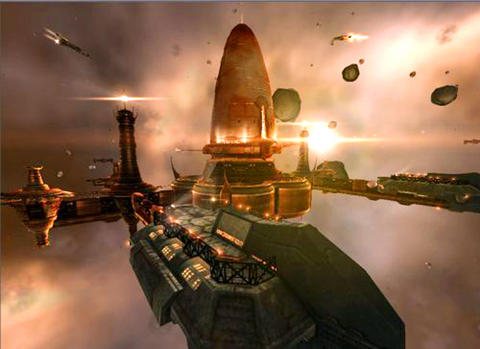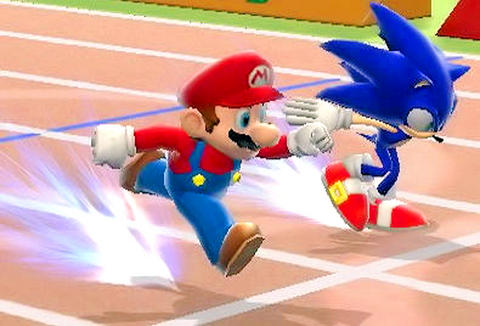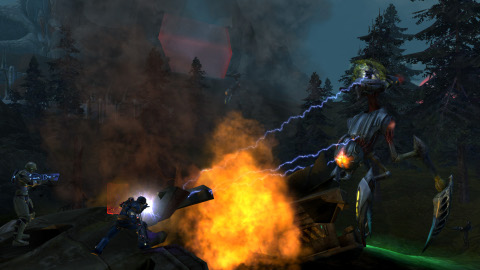After selling almost 200 million games over more than two decades and generating untold billions of US dollars in revenue for Nintendo of Japan, Mario is back with two new games. Super Mario Galaxy, released this month for Nintendo's Wii console, is the first major new Mario game in five years. Also, Mario shares top billing with his longtime rival Sonic the Hedgehog in a separate new game, Mario & Sonic at the Olympic Games.
Mario has always starred in games for everyone. So to test whether it could still appeal to an overeducated, media-saturated audience, I assembled a panel of non-gaming yuppies in their 30s at my house last weekend, put the Wii controls in their hands and sat back to check the reaction.
Judging by the hours of giggles, chortles and guffaws, Mario still has the goods and that incessant tug to play just five more minutes.

The reaction in my living room and elsewhere around the world indicates that Super Mario Galaxy is more than a worthy successor to the franchise's considerable legacy of smiles. It is being widely hailed as the best game yet for the Wii and is drawing plaudits from gamers and magazines alike.
Super Mario is generally a single-player game, but in a nice innovation, a second player can jump in and use a Wii remote to control a separate cursor on the screen that can stun enemies, pick up treasure and otherwise assist the main user controlling Mario. The game's whole feel is so finely tuned, so infectiously enjoyable, that it's understandable why Shigeru Miyamoto, Mario's creator, has been one of the most famous game designers in the world for decades.
My panel of non-experts had a lot of fun with the game's Olympic "events" (up to four can play at one time), especially the trampoline, but that game still is not receiving the praise being lavished on Super Mario Galaxy.

Richard Garriott's Tabula Rasa is another new game in an old series. How does it stack up?
The thing to understand is that playing a "massively multiplayer" online game, or MMO, is a commitment of money and time. MMO players routinely spend hundreds or even thousands of hours on their favorite games over many years. All of that time is an investment in building up the powers and abilities of one's virtual identity, not to mention the fun of adventuring with friends. For all that, players generally spend around US$15 a month.
Tabula Rasa is certainly a lot of fun, and it looks great. In an online gaming market deluged with dragons and elves, its fast-paced science-fiction combat is a refreshing change of pace. There are aliens descending all over the place and firefights stretching over gorgeously rendered landscapes.

Graphically, the game seems to take a page from Starship Troopers, with its bright colors and varied foes.
The big question is whether the game has enough depth to keep players coming back for months or years without devolving into a mindless repetition of "see alien, shoot gun, repeat."
Garriott and the rest of his team at NCsoft have been candid in saying that they are trying to appeal mostly to a broad base of casual gamers rather than to the smaller cadre of hard-core players who might spend 30 hours a week or more on a game.

More than four years after its debut, Eve Online is only now hitting its stride as one of the most interesting games in the world.
Eve takes place in a fictional galaxy in a far future, where humanity has splintered into four competing factions, the theocratic Amarr, the militaristic Caldari, the liberal Gallente and the rebel Minmatar. Players choose a side and find their own path.
At a stage when most games have long since stagnated, Eve continues to grow, recently passing 200,000 subscribers. CCP is planning a major graphics overhaul scheduled for Wednesday.
In many ways, Eve is like the real world. All 200,000 of Eve's players exist in one huge virtual galaxy spanning thousands of solar systems. About 40 percent of Eve's players are European, another 40 percent are North American and about 20 percent are from other continents. They all share one polyglot community around the clock, and at any moment tens of thousands of users are logged on.
More important, the economy and politics of Eve are almost entirely driven by the players themselves.
The most compelling aspect of Eve is that once players control a region of virtual space, they bear the responsibility of policing it, setting taxes, establishing diplomatic relations with neighboring groups and waging battles to protect their territory or take more. In most online games, the advanced content involves getting together with a few dozen friends to battle computer-controlled dragons and demons. In Eve, major battles involve hundreds of players fighting in starships in vast Star Wars-like firefights.

William Liu (劉家君) moved to Kaohsiung from Nantou to live with his boyfriend Reg Hong (洪嘉佑). “In Nantou, people do not support gay rights at all and never even talk about it. Living here made me optimistic and made me realize how much I can express myself,” Liu tells the Taipei Times. Hong and his friend Cony Hsieh (謝昀希) are both active in several LGBT groups and organizations in Kaohsiung. They were among the people behind the city’s 16th Pride event in November last year, which gathered over 35,000 people. Along with others, they clearly see Kaohsiung as the nexus of LGBT rights.

Dissident artist Ai Weiwei’s (艾未未) famous return to the People’s Republic of China (PRC) has been overshadowed by the astonishing news of the latest arrests of senior military figures for “corruption,” but it is an interesting piece of news in its own right, though more for what Ai does not understand than for what he does. Ai simply lacks the reflective understanding that the loneliness and isolation he imagines are “European” are simply the joys of life as an expat. That goes both ways: “I love Taiwan!” say many still wet-behind-the-ears expats here, not realizing what they love is being an

In the American west, “it is said, water flows upwards towards money,” wrote Marc Reisner in one of the most compelling books on public policy ever written, Cadillac Desert. As Americans failed to overcome the West’s water scarcity with hard work and private capital, the Federal government came to the rescue. As Reisner describes: “the American West quietly became the first and most durable example of the modern welfare state.” In Taiwan, the money toward which water flows upwards is the high tech industry, particularly the chip powerhouse Taiwan Semiconductor Manufacturing Co (TSMC, 台積電). Typically articles on TSMC’s water demand

Every now and then, even hardcore hikers like to sleep in, leave the heavy gear at home and just enjoy a relaxed half-day stroll in the mountains: no cold, no steep uphills, no pressure to walk a certain distance in a day. In the winter, the mild climate and lower elevations of the forests in Taiwan’s far south offer a number of easy escapes like this. A prime example is the river above Mudan Reservoir (牡丹水庫): with shallow water, gentle current, abundant wildlife and a complete lack of tourists, this walk is accessible to nearly everyone but still feels quite remote.